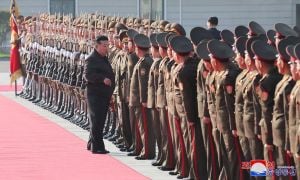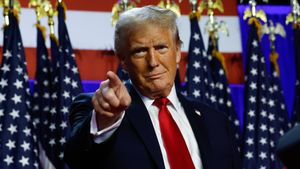Donald Trump's resurgence as president following the 2024 U.S. presidential election has sparked intense global reactions, raising questions and eyebrows around the world. This election, resulting in Trump securing 72 million votes (approximately 50.8%), offers fresh perspectives toward notable global conflicts and the shifting dynamics of U.S. foreign policy.
The stakes are particularly high amid continuing wars and economic turmoil across regions such as the Middle East and Ukraine. Trump's promises of conflict resolution and strategic shifts will have ripple effects, not just on U.S. domestic politics, but also on global alliances and rivalries.
Upon winning the election, Trump expressed strong intentions to reshape U.S. foreign relations. His campaign highlighted themes of non-interventionism and trade protectionism, encapsulated by his “America First” doctrine. The impending policy shifts under his administration could present challenges for longstanding alliances, especially NATO, and create uncertainties for U.S. relationships with nations such as China and Iran.
Russia's war on Ukraine has cast shadows on Europe’s security arrangements, raising the stakes for Trump's administration. During his campaign, Trump maintained he could resolve the Ukrainian crisis rapidly, but specifics were often unclear. A research paper by former national security officials during his previous presidency suggested conditional support for Ukraine, possibly by delaying its NATO membership, which critics argued could compromise European security.
Democratic opponents have lambasted Trump's seeming friendliness toward Russia's President Vladimir Putin as risky for Ukraine and Europe’s security. The question remains if Trump’s approach aligns directly with his past hesitations toward NATO, which he frequently accused of relying on U.S. defense capabilities without contributing appropriately.
Meanwhile, the conflict and the flow of arms supply to Ukraine are bound to spark debates within and beyond U.S. borders, as Trump balances promised negotiations for peace alongside defense commitments. His strategy might provoke significant shifts—not only to Ukraine but throughout Europe as tensions with Russia escalate.
Turning to the Middle East, Trump’s campaign also pledged to usher peace, particularly between Israel and Hamas, alongside tensions with Hezbollah, but again specifics were thin. His previous administration's unequivocation with Israel, marked by the recognition of Jerusalem as its capital, charged his foundational support among his political base but alienated Palestinian interests. Prominent Arab leaders, including those from Saudi Arabia and the UAE, welcomed Trump’s victory but remained skeptical about his ability to influence or quell the region's turmoil.
Saudi Arabia's Crown Prince Mohammed bin Salman emphasized strengthening ties with Trump as imperative, yet the geopolitical climate surrounding Israel and Iran poses significant challenges. King Salman indicated no improvement of relations with Israel could occur without progress toward Palestinian statehood—a demand Trump has not convincingly explored since his return.
A comprehensive look at Trump’s administration suggests he may return to heavy sanctions on Iran, urging for tools to leverage regional peace talks. Reports from analysts indicate Trump's unpredictable style could serve as both advantage and threat, particularly as he navigates through parties who have traditionally clashed.
Chinese leaders are measuring up Trump’s victory, with expectations of heightened trade tensions. Trump’s historical criticism of China, marked by tariffs imposed during his first term, could indicate tough exchanges to come. Some analysts speculate Trump may soften his stance leveraging U.S. negotiations through geopolitical support to counterbalance tensions with Beijing.
Following the election results, international players have voiced mixed feelings. Ukrainian President Volodymyr Zelensky confirmed his congratulations post-election, highlighting potential for continued support, albeit with strings attached. Netanyahu shared his own optimisms, claiming fruitful discussions with Trump since the election outcome, notwithstanding the inherent uncertainties surrounding Iran’s potential regional destabilization strategies.
The ramifications of Trump’s leadership are perhaps epitomized best by the diverse reactions from around the globe—extolling opportunities yet recognizing threats. Political scholars warn of potential isolationist tendencies harming allies and creating voids expected to be filled by adversaries.
Trump’s electoral win brings with it not only swirling uncertainties for existing treaties and weapons deals, but also the added layer of public scrutiny on whether his character will shift the precarious conditions within conflict zones. Has he struck the right balance between interfacing with adversaries and partners alike, or will the policies devolve tensions and deepen divisions?
With tensions running high across multiple fronts—between Ukraine and Russia, Israel and Palestine, within Iranian relations—the frontiers of U.S. foreign policy are reshaping rapidly. Every international leader sees the stakes of Trump’s return as intertwined with the stability of their nations, bringing together anxieties and anticipations fueled by past performances.
Addressing public concerns domestically, Trump’s strategies will be determined not just by foreign dynamics but also by expectations on the home front—a balancing act between strengthening America’s presence abroad and fulfilling domestic promises to his core voter base. Navigational challenges are set to define Trump’s administration as he sifts through familiar and foreign political landscapes posing ever-shifting terrain.



